- Home
- Ernest Hemingway
The Snows of Kilimanjaro and Other Stories Page 3
The Snows of Kilimanjaro and Other Stories Read online
Page 3
“All right.”
The broth was too hot. He had to hold it in the cup until it cooled enough to take it and then he just got it down without gagging.
“You’re a fine woman,” he said. “Don’t pay any attention to me.”
She looked at him with her well-known, well-loved face from Spur and Town and Country, only a little the worse for drink, only a little the worse for bed, but Town and Country never showed those good breasts and those useful thighs and those lightly small-of-back-caressing hands, and as he looked and saw her well known pleasant smile, he felt death come again. This time there was no rush. It was a puff, as of a wind that makes a candle flicker and the flame go tall.
“They can bring my net out later and hang it from the tree and build the fire up. I’m not going in the tent tonight. It’s not worth moving. It’s a clear night. There won’t be any rain.”
So this was how you died, in whispers that you did not hear. Well, there would be no more quarrelling. He could promise that. The one experience that he had never had he was not going to spoil now. He probably would. You spoiled everything. But perhaps he wouldn’t.
“You can’t take dictation, can you?”
“I never learned,” she told him.
“That’s all right.”
There wasn’t time, of course, although it seemed as though it telescoped so that you might put it all into one paragraph if you could get it right.
* * *
There was a log house, chinked white with mortar, on a hill above the lake. There was a bell on a pole by the door to call the people in to meals. Behind the house were fields and behind the fields was the timber. A line of lombardy poplars ran from the house to the dock. Other poplars ran along the point. A road went up to the hills along the edge of the timber and along that road he picked blackberries. Then that log house was burned down and all the guns that had been on deer foot racks above the open fire place were burned and afterwards their barrels, with the lead melted in the magazines, and the stocks burned away, lay out on the heap of ashes that were used to make lye for the big iron soap kettles, and you asked Grandfather if you could have them to play with, and he said, no. You see they were his guns still and he never bought any others. Nor did he hunt any more. The house was rebuilt in the same place out of lumber now and painted white and from its porch you saw the poplars and the lake beyond; but there were never any more guns. The barrels of the guns that had hung on the deer feet on the wall of the log house lay out there on the heap of ashes and no one ever touched them.
In the Black Forest, after the war, we rented a trout stream and there were two ways to walk to it. One was down the valley from Triberg and around the valley road in the shade of the trees that bordered the white road, and then up a side road that went up through the hills past many small farms, with the big Schwarzwald houses, until that road crossed the stream. That was where our fishing began.
The other way was to climb steeply up to the edge of the woods and then go across the top of the hills through the pine woods, and then out to the edge of a meadow and down across this meadow to the bridge. There were birches along the stream and it was not big, but narrow, clear and fast, with pools where it had cut under the roots of the birches. At the Hotel in Triberg the proprietor had a fine season. It was very pleasant and we were all great friends. The next year came the inflation and the money he had made the year before was not enough to buy supplies to open the hotel and he hanged himself.
You could dictate that, but you could not dictate the Place Contrescarpe where the flower sellers dyed their flowers in the street and the dye ran over the paving where the autobus started and the old men and the women, always drunk on wine and bad marc; and the children with their noses running in the cold; the smell of dirty sweat and poverty and drunkenness at the Café des Amateurs and the whores at the Bal Musette they lived above. The Concierge who entertained the trooper of the Garde Republicans in her loge, his horse-hair-plumed helmet on a chair. The locataire across the hall whose husband was a bicycle racer and her joy that morning at the Cremerie when she had opened L’Auto and seen where he placed third in Paris-Tours, his first big race. She had blushed and laughed and then gone upstairs crying with the yellow sporting paper in her hand. The husband of the woman who ran the Bal Musette drove a taxi and when he, Harry, had to take an early plane the husband knocked upon the door to wake him and they each drank a glass of white wine at the zinc of the bar before they started. He knew his neighbors in that quarter then because they all were poor.
Around that Place there were two kinds; the drunkards and the sportifs. The drunkards killed their poverty that way; the sportifs took it out in exercise. They were the descendants of the Communards and it was no struggle for them to know their politics. They knew who had shot their fathers, their relatives, their brothers, and their friends when the Versailles troops came in and took the town after the Commune and executed any one they could catch with calloused hands, or who wore a cap, or carried any other sign he was a working man. And in that poverty, and in that quarter across the street from a Boucherie Chevaline and a wine co-operative he had written the start of all he was to do. There never was another part of Paris that he loved like that, the sprawling trees, the old white plastered houses painted brown below, the long green of the autobus in that round square, the purple flower dye upon the paving, the sudden drop down the hill of the rue Cardinal Lemoine to the River, and the other way the narrow crowded world of the rue Mouffetard. The street that ran up toward the Pantheon and the other that he always took with the bicycle, the only asphalted street in all that quarter, smooth under the tires, with the high narrow houses and the cheap tall hotel where Paul Verlaine had died. There were only two rooms in the apartments where they lived and he had a room on the top floor of that hotel that cost him sixty francs a month where he did his writing, and from it he could see the roofs and chimney pots and all the hills of Paris.
From the apartment you could only see the wood and coal man’s place. He sold wine too, bad wine. The golden horse’s head outside the Boucherie Chevaline where the carcasses hung yellow gold and red in the open window, and the green painted co-operative where they bought their wine; good wine and cheap. The rest was plaster walls and the windows of the neighbors. The neighbors who, at night, when some one lay drunk in the street, moaning and groaning in that typical French ivresse that you were propaganded to believe did not exist, would open their windows and then the murmur of talk.
“Where is the policeman? When you don’t want him the bugger is always there. He’s sleeping with some concierge. Get the Agent.” Till some one threw a bucket of water from a window and the moaning stopped. “What’s that? Water. Ah, that’s intelligent.” And the windows shutting. Marie, his femme de menage, protesting against the eight-hour day saying, “If a husband works until six he gets only a little drunk on the way home and does not waste too much. If he works only until five he is drunk every night and one has no money. It is the wife of the working man who suffers from this shortening of hours.”
“Wouldn’t you like some more broth?” the woman asked him now.
“No, thank you very much. It is awfully good.”
“Try just a little.”
“I would like a whiskey-soda.”
“It’s not good for you.”
“No. It’s bad for me. Cole Porter wrote the words and the music. This knowledge that you’re going mad for me.”
“You know I like you to drink.”
“Oh yes. Only it’s bad for me.”
When she goes, he thought. I’ll have all I want. Not all I want but all there is. Ayee he was tired. Too tired. He was going to sleep a little while. He lay still and death was not there. It must have gone around another street. It went in pairs, on bicycles, and moved absolutely silently on the pavements.
No, he had never written about Paris. Not the Paris that he cared about. But what about the rest that he had never written?
What ab
out the ranch and the silvered gray of the sage brush, the quick, clear water in the irrigation ditches, and the heavy green of the alfalfa. The trail went up into the hills and the cattle in the summer were shy as deer. The bawling and the steady noise and slow moving mass raising a dust as you brought them down in the fall. And behind the mountains, the clear sharpness of the peak in the evening light and, riding down along the trail in the moonlight, bright across the valley. Now he remembered coming down through the timber in the dark holding the horse’s tail when you could not see and all the stories that he meant to write.
About the half-wit chore boy who was left at the ranch that time and told not to let any one get any hay, and that old bastard from the Forks who had beaten the boy when he had worked for him stopping to get some feed. The boy refusing and the old man saying he would beat him again. The boy got the rifle from the kitchen and shot him when he tried to come into the barn and when they came back to the ranch he’d been dead a week, frozen in the corral, and the dogs had eaten part of him. But what was left you packed on a sled wrapped in a blanket and roped on and you got the boy to help you haul it, and the two of you took it out over the road on skis, and sixty miles down to town to turn the boy over. He having no idea that he would be arrested. Thinking he had done his duty and that you were his friend and he would be rewarded. He’d helped to haul the old man in so everybody could know how bad the old man had been and how he’d tried to steal some feed that didn’t belong to him, and when the sheriff put the handcuffs on the boy he couldn’t believe it. Then he’d started to cry. That was one story he had saved to write. He knew at least twenty good stories from out there and he had never written one. Why?
“You tell them why,” he said.
“Why what, dear?”
“Why nothing.”
She didn’t drink so much, now, since she had him. But if he lived he would never write about her, he knew that now. Nor about any of them. The rich were dull and they drank too much, or they played too much backgammon. They were dull and they were repetitious. He remembered poor Julian and his romantic awe of them and how he had started a story once that began, “The very rich are different from you and me.” And how some one had said to Julian, Yes, they have more money. But that was not humorous to Julian. He thought they were a special glamourous race and when he found they weren’t it wrecked him just as much as any other thing that wrecked him.
He had been contemptuous of those who wrecked. You did not have to like it because you understood it. He could beat anything, he thought, because no thing could hurt him if he did not care.
All right. Now he would not care for death. One thing he had always dreaded was the pain. He could stand pain as well as any man, until it went on too long, and wore him out, but here he had something that had hurt frightfully and just when he had felt it breaking him, the pain had stopped.
He remembered long ago when Williamson, the bombing officer, had been hit by a stick bomb some one in a German patrol had thrown as he was coming in through the wire that night and, screaming, had begged every one to kill him. He was a fat man, very brave, and a good officer, although addicted to fantastic shows. But that night he was caught in the wire, with a flare lighting him up and his bowels spilled out into the wire, so when they brought him in, alive, they had to cut him loose. Shoot me, Harry. For Christ sake shoot me. They had had an argument one time about our Lord never sending you anything you could not bear and some one’s theory had been that meant that at a certain time the pain passed you out automatically. But he had always remembered Williamson, that night. Nothing passed out Williamson until he gave him all his morphine tablets that he had always saved to use himself and then they did not work right away.
Still this now, that he had, was very easy; and if it was no worse as it went on there was nothing to worry about. Except that he would rather be in better company.
He thought a little about the company that he would like to have.
No, he thought, when everything you do, you do too long, and do too late, you can’t expect to find the people still there. The people all are gone. The party’s over and you are with your hostess now.
I’m getting as bored with dying as with everything else, he thought.
“It’s a bore,” he said out loud.
“What is, my dear?”
“Anything you do too bloody long.”
He looked at her face between him and the fire. She was leaning back in the chair and the firelight shone on her pleasantly lined face and he could see that she was sleepy. He heard the hyena make a noise just outside the range of the fire.
“I’ve been writing,” he said. “But I got tired.”
“Do you think you will be able to sleep?”
“Pretty sure. Why don’t you turn in?”
“I like to sit here with you.”
“Do you feel anything strange?” he asked her.
“No. Just a little sleepy.”
“I do,” he said.
He had just felt death come by again.
“You know the only thing I’ve never lost is curiosity,” he said to her.
“You’ve never lost anything. You’re the most complete man I’ve ever known.”
“Christ,” he said. “How little a woman knows. What is that? Your intuition?”
Because, just then, death had come and rested its head on the foot of the cot and he could smell its breath.
“Never believe any of that about a scythe and a skull,” he told her. “It can be two bicycle policemen as easily, or be a bird. Or it can have a wide snout like a hyena.”
It had moved up on him now, but it had no shape any more. It simply occupied space.
“Tell it to go away.”
It did not go away but moved a little closer.
“You’ve got a hell of a breath,” he told it. “You stinking bastard.”
It moved up closer to him still and now he could not speak to it, and when it saw he could not speak it came a little closer, and now he tried to send it away without speaking, but it moved in on him so its weight was all upon his chest, and while it crouched there and he could not move, or speak, he heard the woman say, “Bwana is asleep now. Take the cot up very gently and carry it into the tent.”
He could not speak to tell her to make it go away and it crouched now, heavier, so he could not breathe. And then, while they lifted the cot, suddenly it was all right and the weight went from his chest.
It was morning and had been morning for some time and he heard the plane. It showed very tiny and then made a wide circle and the boys ran out and lit the fires, using kerosene, and piled on grass so there were two big smudges at each end of the level place and the morning breeze blew them toward the camp and the plane circled twice more, low this time, and then glided down and levelled off and landed smoothly and, coming walking toward him, was old Compton in slacks, a tweed jacket and a brown felt hat.
“What’s the matter, old cock?” Compton said.
“Bad leg,” he told him. “Will you have some breakfast?”
“Thanks. I’ll just have some tea. It’s the Puss Moth you know. I won’t be able to take the Memsahib. There’s only room for one. Your lorry is on the way.”
Helen had taken Compton aside and was speaking to him. Compton came back more cheery than ever.
“We’ll get you right in,” he said. “I’ll be back for the Mem. Now I’m afraid I’ll have to stop at Arusha to refuel. We’d better get going.”
“What about the tea?”
“I don’t really care about it you know.”
The boys had picked up the cot and carried it around the green tents and down along the rock and out onto the plain and along past the smudges that were burning brightly now, the grass all consumed, and the wind fanning the fire, to the little plane. It was difficult getting him in, but once in he lay back in the leather seat, and the leg was stuck straight out to one side of the seat where Compton sat. Compton started the motor and got in. He waved to H
elen and to the boys and, as the clatter moved into the old familiar roar, they swung around with Compie watching for wart-hog holes and roared, bumping, along the stretch between the fires and with the last bump rose and he saw them all standing below, waving, and the camp beside the hill, flattening now, and the plain spreading, clumps of trees, and the bush flattening, while the game trails ran now smoothly to the dry waterholes, and there was a new water that he had never known of. The zebra, small rounded backs now, and the wildebeeste, big-headed dots seeming to climb as they moved in long fingers across the plain, now scattering as the shadow came toward them, they were tiny now, and the movement had no gallop, and the plain as far as you could see, gray-yellow now and ahead old Compie’s tweed back and the brown felt hat. Then they were over the first hills and the wildebeeste were trailing up them, and then they were over mountains with sudden depths of green-rising forest and the solid bamboo slopes, and then the heavy forest again, sculptured into peaks and hollows until they crossed, and hills sloped down and then another plain, hot now, and purple brown, bumpy with heat and Compie looking back to see how he was riding. Then there were other mountains dark ahead.

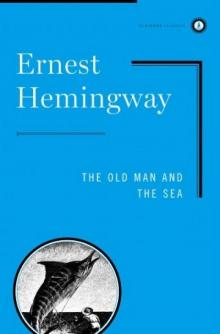 The Old Man and the Sea
The Old Man and the Sea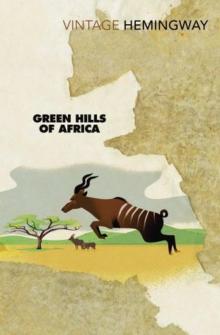 Green Hills of Africa
Green Hills of Africa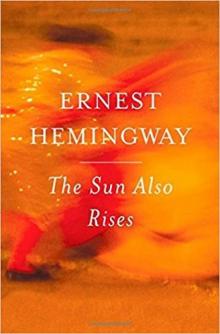 The Sun Also Rises
The Sun Also Rises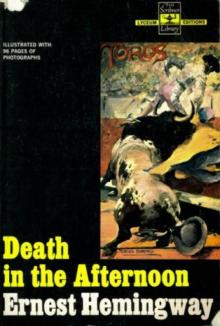 Death in the Afternoon
Death in the Afternoon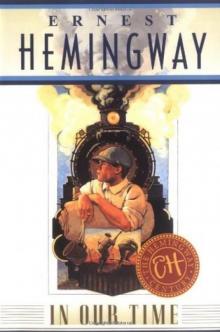 In Our Time
In Our Time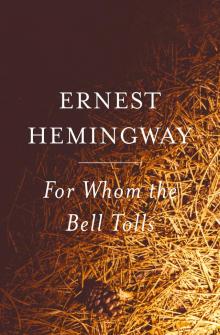 For Whom the Bell Tolls
For Whom the Bell Tolls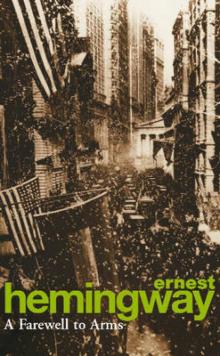 A Farewell to Arms
A Farewell to Arms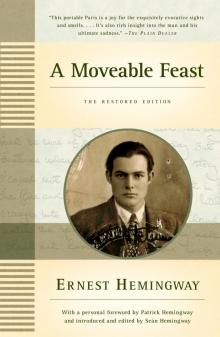 A Moveable Feast
A Moveable Feast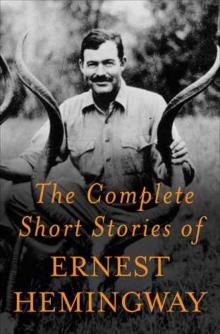 The Complete Short Stories of Ernest Hemingway
The Complete Short Stories of Ernest Hemingway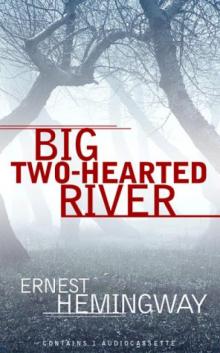 Big Two-Hearted River
Big Two-Hearted River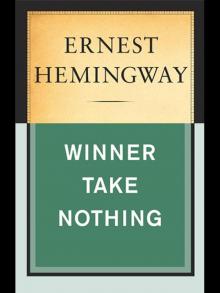 Winner Take Nothing
Winner Take Nothing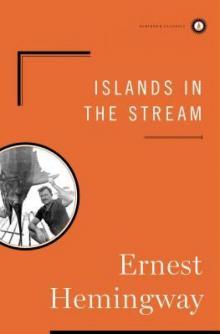 Islands in the Stream
Islands in the Stream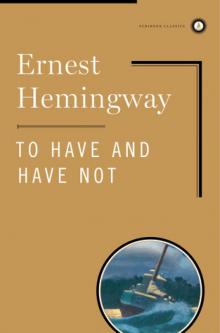 To Have and Have Not
To Have and Have Not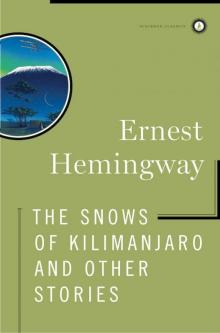 The Snows of Kilimanjaro and Other Stories
The Snows of Kilimanjaro and Other Stories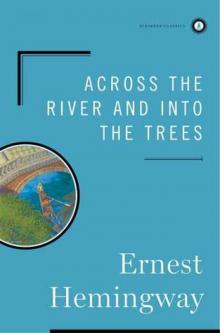 Across the River and Into the Trees
Across the River and Into the Trees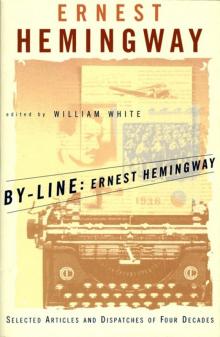 By-Line Ernest Hemingway
By-Line Ernest Hemingway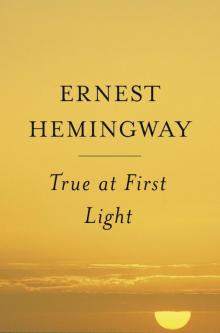 True at First Light
True at First Light Men Without Women
Men Without Women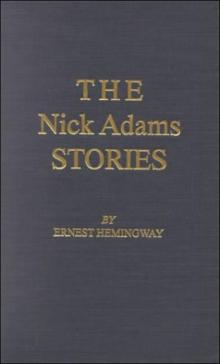 The Nick Adams Stories
The Nick Adams Stories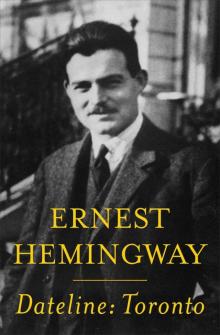 Dateline- Toronto
Dateline- Toronto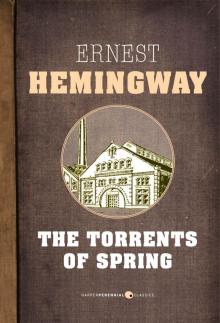 The Torrents of Spring
The Torrents of Spring Short Stories
Short Stories